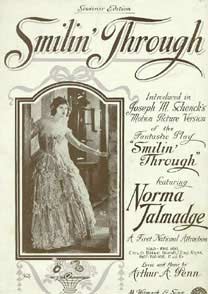.gif)
Smilin' Through (song)
Encyclopedia

History
The song "Smilin' Through" was first published in 1919 by M. Witmark and Sons. It was recorded by many singers, including John McCormack, Eleanor SteberEleanor Steber
Eleanor Steber was an American operatic soprano. Steber is noted as one of the first major opera stars to have achieved the highest success with training and a career based in the United States.-Biography:...
, Nelson Eddy
Nelson Eddy
Nelson Ackerman Eddy was an American singer and actor who appeared in 19 musical films during the 1930s and 1940s, as well as in opera and on the concert stage, radio, television, and in nightclubs. A classically trained baritone, he is best remembered for the eight films in which he costarred...
, and Judy Garland
Judy Garland
Judy Garland was an American actress and singer. Through a career that spanned 45 of her 47 years and for her renowned contralto voice, she attained international stardom as an actress in musical and dramatic roles, as a recording artist and on the concert stage...
, and remained a popular standard for decades.
Penn's song was also closely associated with the 1919 play Smilin' Through by Jane Cowl
Jane Cowl
Jane Cowl was an American film and stage actress and playwright "notorious for playing lacrymose parts". Actress Jane Russell was named in Cowl's honor.-Biography:...
. The creation of the song and that of the play were independent but intertwined. According to Isidore Witmark in his history of the Witmark and Sons publishing house, Cowl's play was partially rewritten after the song was published, based upon the imagery of the lyrics. Both the title and music of the song were incorporated into the play when it was completed and produced on Broadway in December, 1919.
The melody was also used to accompany the 1922 silent film
Smilin' Through (1922 film)
Smilin' Through is a 1922 silent film based on the 1919 play of the same name, written by Jane Cowl and Jane Murfin . The film starred Norma Talmadge, Harrison Ford, and Wyndham Standing. It was co-written and directed by Sidney Franklin, who also directed the more famous 1932 remake at MGM...
. The soundtracks for both the 1932
Smilin' Through (1932 film)
Smilin' Through is a 1932 MGM film based on the play by Jane Cowl and Jane Murfin, also named Smilin' Through.The film was nominated for the Academy Award for Best Picture for 1932. It was adapted from Cowl and Murfin's play by James Bernard Fagan, Donald Ogden Stewart, Ernest Vajda and Claudine...
and 1941
Smilin' Through (1941 film)
Smilin' Through is a 1941 MGM musical film based on the 1919 play of the same name by Jane Cowl and Jane Murfin.The film was a remake of a previous 1932 version by MGM and was the third and final film version of the play. It starred Jeanette MacDonald, Brian Aherne and Ian Hunter...
MGM films of Smilin' Through feature the song as well. It forms the title music for both films and Jeanette MacDonald
Jeanette MacDonald
Jeanette MacDonald was an American singer and actress best remembered for her musical films of the 1930s with Maurice Chevalier and Nelson Eddy...
sings it in the latter film. Norma Shearer
Norma Shearer
Edith Norma Shearer was a Canadian-American actress. Shearer was one of the most popular actresses in North America from the mid-1920s through the 1930s...
's character sings the song in the 1932 film, dubbed by singer Georgia Stark.
Jazz saxophonist Wayne Shorter
Wayne Shorter
Wayne Shorter is an American jazz saxophonist and composer.He is generally acknowledged to be jazz's greatest living composer, and many of his compositions have become standards...
plays his own interpretation of the ballad on the album "Beyond the Sound Barrier" (2005). The 12 minute track bears little resemblance to the original; it is more reflective of Shorter's feelings about the song, one of his favorites.
External links
- 1919 recording by Reinald Werrenrath of "Smilin' Through" at YouTube.
- Smilin' Through at International Lyrics Playground

